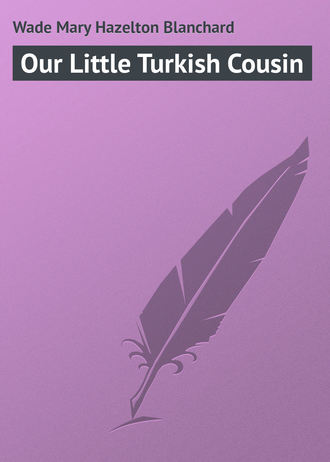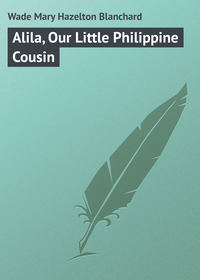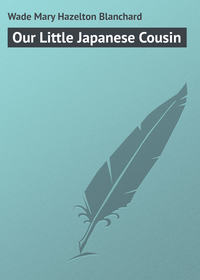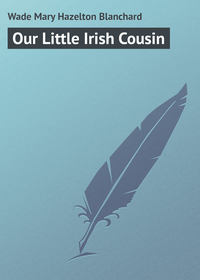 полная версия
полная версияOur Little Turkish Cousin
"Turkey is the only country in Europe that does not believe in the Christian faith. Its most important city is on the shores of a strait through which a great deal of trade is carried from all parts of the world. These are some of the reasons different countries would like to get control of Turkey and its great city. They all look toward it with longing eyes.
"Besides these things, the Sultan himself is not a good ruler for his people. He has many wives and hundreds of slaves. Many of his people follow his bad example and buy slaves, both black and white."
But little Osman knows nothing of what is said about the Sultan and the people of his land. It has never entered his head that it is wrong to buy and sell human beings.
His mother is kind to her slaves, and does not make them work hard. Sometimes, too, she frees one of her slave women. They are happy, she thinks.
"But, dear little Osman," you would say, "it is the right of every one to be free. Perhaps when you grow up you will see this, and help to make things different in your country."
Let us go back now to the little boy and his father as they sat talking of the Sultan and his palace.
"He dresses very plainly," said the Turk. "But in the old days, the ruler's garments were very rich, and his fez fairly blazed with diamonds. If you had lived then, Osman, your eyes would have been dazzled when you looked at him."
"I wish I could have seen some of the things my grandmother has described," answered his son. "But I'm glad I wasn't living during the revolution of the janizaries. Everybody must have been scared then.
"Is it really true that Sultan Mahmoud's old nurse saved his life by hiding him away in an oven?"
"Yes, but he wasn't Sultan then. He was the heir to the throne, however."
"What made the trouble, papa?"
"Sultan Selim III. was a wise ruler. He wished to improve his country. At one time the janizaries were the best trained and most useful troops. They were chosen from the Christians who were taken captive in war.
"But after awhile, men with no training and with selfish motives managed to get into their ranks. Sultan Selim knew they were harmful to the Empire, and intended to disband them. They found out what he was about to do, took the city and palace by surprise, and killed the good Selim.
"As soon as his son's old nurse heard the uproar, she hurried to Mahmoud and said, 'Come with me at once; your life must be saved.' She led him to an old furnace in the palace and begged him to get inside.
"'No matter what happens, nor who calls your name, do not make a sound until I speak to you,' she told him.
"He did as she said. Hour after hour, he stayed quietly inside the furnace while his father and many of his friends were being cruelly killed.
"The Sultan's enemies hunted everywhere for him, but he was nowhere to be found. They called his name coaxingly, but he knew better than to answer any one else than his old nurse, so he did not make a sound.
"In the meanwhile, the old woman was patiently watching. When the janizaries had gone away, she went to the door of the furnace and whispered to Mahmoud. She told him he now had a chance to gather his men about him and seize the government.
"There was not a moment to lose; Mahmoud was quite a young man, but he had a strong nature. His wonderful eyes showed that.
"He came out from his hiding-place and succeeded in gaining control of the city. The wicked janizaries were conquered, but Mahmoud had a sad and troubled reign. Blessed be his memory!"
CHAPTER VI
A TURKISH BATH
"Osman, you may go with me to the public bath-house," said his father, one bright morning. "I have business at the bazaar to-day, and we will go there afterward. You can have a good bath."
Osman was delighted. A whole day with his father was a great treat. Besides, it pleased him to think of a visit to the public bath-house.
There was a large marble bath-room in his own home, and there were furnaces underneath to heat it. There were servants to wait upon him as he bathed. "Yet the public bath is better still," thought Osman, "and I love to go there." Probably you have all heard of Turkish baths. They are so delightful that people in America and other countries have copied them from the Turks. They have built similar bath-houses in their cities.
"Are we to drive or walk, papa?" asked Osman.
"We will drive. The carriage will be here in a few moments."
After a short drive they drew up in front of a large and handsome building. It was the public bath-house.
The first room entered by Osman and his father was a large hall. It was open overhead to let in the fresh air. There was a raised platform around the sides. This platform was covered with a soft carpet and divided into small dressing-rooms. Each visitor would have one of these for himself.
A fountain was playing in the middle of the hall, making sweet music as the water fell into the marble basin.
"Go into one of those little rooms and take off your clothing, Osman," said his father.
The little boy was soon ready for the bath. The attendant had wound three bright-bordered towels around him. One of these was tied about his waist, the second was twisted into a turban around his head, while the third one was thrown over his shoulders. He would not catch cold, for the towels were thick and warm. He wore wooden slippers on his feet.
Now for the warm chamber.
Osman knew what was coming. He went at once to the marble platform in the middle of the room. There he stretched himself on a soft mattress which the attendants placed for him.
They began to rub his feet and limbs very gently. How pleasant and restful it was! The little boy soon began to perspire. This was the time for moving him into a still warmer room, called the hot chamber.
Here Osman was rubbed briskly with a camel's-hair glove after a bowl of water had been poured over his body.
"Oh, how good this is," he thought, sleepily, when scented water was brought in, the attendant using the soft fibres of the palm in bathing him with the fragrant water. It was very, very pleasant.
There was no hurry. Hot clothing was laid on the boy when this last bathing was over; cold water was poured over his feet and he was taken to the cooling-room. Here he could lie on a soft, pleasant couch as long as he wished.
After a good rest, how the blood danced through every part of his body! Tired! It did not seem as though he could ever be tired again in his life. He was ready for any amount of walking and sightseeing.
"Father," he said, as they left the building and turned into one of the busiest streets, "I think a bath is one of the pleasantest things in the whole world."
"It almost makes a new man out of an old one," answered the serious Turk.
He never called himself a Turk, however. He would feel insulted to hear us speak of him in that manner. He would say, "I am an Osmanli, that is, a subject of the empire founded by Osman."
Osman, the founder of the empire, is also called Otman, so the subjects are sometimes spoken of as Ottomans, and their country as the Ottoman Empire.
Now let us go back to our little Osman and his father.
"See that poor beggar," whispered the little boy. "May I give him a coin, papa?"
It was a sickly-looking old man who filled Osman's heart with pity. He was very dirty, and his clothes were torn and ragged, although they were gay with bright colours. As he leaned against the side of a fountain, he made a picture you would like to paint. He kept crying, "Baksheesh, baksheesh," to the passers-by.
What a beautiful fountain it was! It had a wide roof, giving a pleasant shade. There were gilded gratings all around it, worked in lovely patterns, – roses and honeysuckles and trailing vines.
Brass drinking-cups, hanging around the sides, seemed to say, "Come, thirsty traveller, come and drink."
What a fluttering and cooing there was over the roof. At least a hundred pigeons were flying about, fearless and happy. No one would harm them, not even the ragged street boys who were playing about the fountain and ready for any mischief.
After Osman had given a silver coin to the beggar, his father pointed to the fountain, and said, "Look, my child, at the beautiful pattern of the grating."
"How pretty the gilded flowers are," answered Osman. "I love to see them. But, papa, there are ever so many fountains in our city. Nearly half of them are as pretty as this one. I believe there is hardly a street without one."
"I knew a very good man who died a few months ago. He left his money to be used in building a fountain. It was a kind deed. Don't you think so?"
"Yes, indeed, papa. There are always people and animals who are thirsty. It is a comfort to have fresh water at hand, especially if it is a warm day."
As Osman was speaking, he heard a sound of music. Looking down the street, he saw two gipsies coming toward him. The man was playing on a bagpipe, and leading a tame bear. The woman was dressed in bright colours. She was beating a tambourine.
"Isn't it pretty music, papa? Oh, do look at the bear," cried Osman. "He is doing some tricks."
His father was in no hurry, so he and Osman joined the crowd who gathered around the gipsies. The bear danced in time to the music, and did other amusing things.
Osman tossed him a coin, which he carried to his master. This pleased the others, and they threw him some more coins.
"At this rate, the gipsies will go home to-night quite rich," laughed Osman's father, as they passed on. "We will go to the bazaar now. I must attend to some business there before it is much later."
"See that man with the tiger's skin over his shoulders," said Osman, a few minutes later. "He is clothed in rags, but he isn't a beggar, is he?"
"No, indeed, Osman. He is without doubt a wise man of our own faith, who prefers to be poor. He has probably come to the city to visit some holy tomb, in order to keep a vow he has made. He may have travelled many hundreds of miles. You should honour him, my little boy."
Osman and his father still moved through the crowd of busy people. They passed many Greeks and Armenians, who carry on a large share of the business of the city. There were also Englishmen and Americans, who were seeing the sights of this strange, lively place.
There were serious-looking Mohammedan priests in white and green turbans, with their eyes bent down to the ground. There were water-carriers with big jars on their backs, and sweetmeat-sellers with scales on which they were ever ready to weigh out the rich candies of Turkey.
As for dogs and beggars, there were hundreds of them, without a doubt.
"There is the bazaar, papa. I can see it on the hilltop beyond us."
It was an immense building of a brownish gray colour. You might almost call it a city in itself.
As Osman and his father began to climb the hill, they made their way between many stands and tiny booths where goods were for sale. Everything looked inviting, and Osman saw several things he wished to buy.
"See those lovely grapes, papa. I should like to carry some of them home," said the boy. But his father would not stop.
"We will not buy anything till we reach the bazaar," he said. "You will see enough there to tempt you, I do not doubt."
They passed on, and soon reached the entrance of the great building. It was quiet and dark inside, and there were many narrow little streets or passages, through which hundreds of people were moving. Each narrow passage was given up to the sale of some special thing.
The shopkeepers were from many different countries. There were shrewd Armenians, wily Greeks, Persians with big caps on their heads, and Turks with long beards, squatting comfortably by their counters.
The high roof was over all. Light was given by great numbers of little domes shining in every direction through this city of shops.
It was very pleasant to Osman. He liked to watch the crowds and look at the many lights. He enjoyed the strange odours of the East. He never grew tired of looking at the rich and beautiful goods for sale, – the goods of Europe, Asia, and Africa. Three continents seemed to meet in the great bazaar of Constantinople.
"Oh, papa, please look at these lovely stones. I should like to buy that necklace for mamma, she is so fond of amber."
But the boy's father replied, "Not to-day, Osman, not to-day."
Some queerly wrought swords now caught the boy's eye. They were made of the finest steel, and the handles were richly ornamented.
"How I wish I could have one of those for my very own, papa. Mayn't I please have one?"
"When you are a young man, Osman, we will look for the most elegant sword to be bought. But not now, my child."
Osman forgot his longing for a sword when he stood in front of a stand where perfumes were sold.
"We will buy some of this attar of roses. It will please your mother, and you may give it to her," said the father.
The Turks are fond of delicate perfumes, and there is none they like better than attar of roses, which is largely made in Turkey, and sent from there to other countries.
"Why does it cost so much?" asked Osman, as his father handed a gold coin to the shopkeeper.
"It is because only a few drops can be obtained from hundreds and hundreds of the flowers. Next year, you shall take a journey with me, Osman. I am going to the part of our country where the roses are raised for this purpose. It is a beautiful sight, – the fields thickly dotted with the sweet-smelling blossoms. You shall then see how the people get fragrant perfume from the flowers."
"I'm getting so hungry, papa. Can't we get some lunch? That cheese makes my mouth water."
A man with a round wicker basket containing different kinds of cheese was going through the street and calling his wares.
"Hush, Osman." His father pointed to the tower of a small mosque.
High up in this tower stood a man crying out to all faithful believers of Mohammed. It was the call to prayer.
Five times each day this prayer-caller mounted the tower. Each time he cried out to the people who were within reach of his voice.
Osman and his father instantly turned toward the sacred city of Mecca, and, kneeling down right where they stood, repeated a short prayer.
Then they slowly rose and turned their steps toward a restaurant, where they could get a delicious lunch.
There were many other peddlers in the streets besides the cheese-seller. Some of the shoppers bought what they wished from these peddlers. They could get unleavened bread or biscuits, custards, ices, sherbet, sweetmeats, hot vegetables, and many other things.
But Osman's father said, "We can be more comfortable in the restaurant. Besides, I should like a good dish of kebaby."
Kebaby! It was an odd name and an odd dish.
"It is very, very good," thought our little Turkish cousin, as he began to eat from the steaming soup-plate set before him.
The cook had placed tiny squares of unleavened bread in the bottom of the dish. Over this he had poured a quantity of sour cream, and last of all came little squares of hot meat. The dish was seasoned with salt, pepper, cardamom, and sumach.
"Good! Yes, very good," said Osman's father, as he tasted the kebaby. "There is nothing I like better."
When the lunch was over, he and his little son went to that part or the bazaar where carpets were sold. After many words about the price, a beautiful rug was purchased. Its colours were soft and rich. It was woven so closely it would last for many years. The shopkeeper had said it would be good for a lifetime, and he probably spoke the truth.
"Before we go home, will you take me out on the bridge of boats?" asked Osman. "It isn't far from the bazaar."
"Aren't you too tired?"
"No, indeed; the bath this morning made me ready for anything."
A short walk brought Osman and his father to the bridge of which he had spoken. It joins the main city of Constantinople and the suburb of Pera.
"It doesn't seem as though the bridge could be made of boats until we look over the sides, does it?" said Osman.
"No, dear. They are firmly chained together and covered with such strong planks that this bridge seems like any other. I must say I like to come here, myself. We can get such a fine view of the Golden Horn."
"Why do people call our harbour the Golden Horn?"
"It is shaped somewhat like a horn. Besides this, it is the channel through which many shiploads of the richest goods are carried. Think of the precious things you saw in the bazaar to-day, the beautiful gems, the spices, the silks, the shawls of camel's hair."
"I understand now. But look! There is a camel with a heavy load on his back. His master is leading him. I love camels."
"When I was a little boy," said his father, "my mother used to tell me stories of the old times. In those days there were none of the new-fashioned carriages in our streets. Only the gaily trimmed arabas, and sedan-chairs carried on men's shoulders could be seen."
"Mamma sometimes goes in a sedan-chair now," said Osman. "It must be a warm way of riding in summer-time, though. The close curtains keep out the air."
"You would have liked to see the camels in the old days, Osman. Merchants often travelled through the streets with whole processions of those animals. They went very slowly, to be sure, and they blocked up the streets. But camels are steady, faithful creatures, and are good beasts of burden."
"The dress of the people was much prettier long ago, wasn't it?"
"Indeed, it was. It is a shame so many of our people copy the fashions of other countries. The dress now looks stiff and ugly beside the loose robes and bright colours of the old times. But see, my child, the day has left us and I am tired. We must hasten homeward."
CHAPTER VII
THE WEDDING
"I wish I could have been there," thought Osman.
It was Friday morning, and the little boy was sitting beside his mother while she described the wedding-festival given in honour of two dear friends. She and her husband had spent all day Thursday at the bridegroom's house.
"It was a grand time, my little son. I wish you could have enjoyed it with us, but you were too ill to leave home," said Osman's mother, as she lovingly patted his cheek.
"Was there a great crowd, mamma?"
"Yes, indeed, for the young couple have hosts of friends. The ladies, of course, rode in carriages, and the men were on horseback. A band of music played lively tunes as we escorted the young bride to her new home.
"When we reached the house, the bridegroom stood waiting in the doorway. He led his bride to the bower in the bridal chamber, and, leaving her there, went to the 'place of greeting' to receive his gentlemen friends."
"You helped in making the bower, didn't you, mamma?"
"Yes. I went to the new home on Monday, with other friends and the relatives of the bride. The wedding-outfit and the presents had already been brought by some trusty porters.
"After we had refreshed ourselves with a lunch of coffee and sweetmeats, we began to decorate the bridal chamber. We hung the bride's pretty dresses, her shawls and prayer-carpet, her embroidered sheets and towels, on cords fastened along the walls.
"Then we chose one corner of the room for the bower. We hung up fine embroideries and festoons of gauze, and fastened numbers of artificial flowers here and there in the draperies. When it was done it was lovely!"
Osman's mother sighed with delight as she thought of it.
"But our work did not stop there, my dear. Oh, no. We placed the most precious wedding-presents in glass cases, so every one could see and admire them. Then we hung garlands of flowers on the walls of the room. It was very beautiful now.
"When this room was finished, we went into the next one and set up the new furniture and bedding, the beautiful candelabra, the smoking-set, and the kitchen ware."
"What did you do on Tuesday, mamma?"
"We went with the bride to the bath. When it was over, she put on borrowed clothing. Some bad fortune might come to her, if she did not follow this old custom."
"You spent Wednesday with the bride, too, didn't you?"
"Certainly, Osman. That is a very important day in the wedding-festival. I went to the bride's house quite early in the day, for we are very close friends. I helped her in receiving the bridegroom's mother and other relatives. All her special friends gathered there with me. We formed in a double row and helped the other guests up the stairs.
"I hope my dear Morgiana will be good friends with her new mother. As they sat side by side, the old lady passed sugar from her own mouth to that of her daughter-in-law."
"Why was that, mamma?"
"It was a token of the good feeling there will be between them, Osman."
"Dear me, a wedding-festival is a grand thing, isn't it? I wish I could have gone Thursday with you and papa. That was the greatest day of all."
"Yes, it was a very pleasant time for every one. There was an entertainment in the place of greeting for the men, and another for the women in the bride's rooms. Some gipsy girls danced and sang for us and we had refreshments."
"What was the bride doing all this time, mamma?"
"As soon as the bridegroom had led her to the bridal bower and gone away, her veil was raised. We could now look at her beautiful face as much as we liked, and admire her wedding-gown and presents."
"Did many poor people come in to look at the pretty things?" asked Osman. His voice was rather sad as he said the word "poor." He pitied those who did not have a lovely home like himself, and plenty to eat and to wear.
"It is so hard to be poor and have to work hard from early morning till late at night," he often thought.
"Yes, indeed, Osman. The house was filled with people all day long. No one was turned away from the door," answered his mother. "I saw women in shabby clothing standing beside the most richly dressed ladies. They seemed to enjoy the festival very much."
"When did the bridegroom enter, mamma?"
"As soon as the evening prayer had been recited in the 'place of greeting.' Then the bridegroom hurriedly left his men friends and started for the bridal bower."
Osman began to laugh. "I know what the men did then, mamma. I have heard papa tell about it. They pelted the bridegroom with old shoes and struck his back many a sharp blow. No wonder he hurried up-stairs as fast as he could go."
The boy's mother smiled. "And I can tell you what happened after the door closed behind him, although we visitors now took our leave. I well remember my own wedding.
"The bride kissed his hand as he entered. He knelt down on her veil and made a short prayer. After this a mirror was held in front of the young couple by an old woman friend of the bride, so they could see their faces in it side by side.
"Then sugar was passed from the young man's mouth to that of the bride. It was a symbol of the sweetness of their future life.
"But, my dear child, I have been so busy talking I did not notice the time. I must leave you to dress for the banquet at the home of our young friends. Run away and play with Selim."
CHAPTER VIII
THE CHILDREN'S CARNIVAL
"Selim, Selim, you will be late if you don't hurry," called Osman.
He himself had been ready for five whole minutes, and was becoming impatient because his little friend was not in sight. So he ran across the street to Selim's house to find out what was the matter.
"I will be dressed in a minute or two," said Selim. Osman sat down to count his marbles while he waited.
The two boys were going to a children's carnival in the grand courtyard of a certain mosque. Their mothers would go with them. Hundreds and hundreds of children would gather there to make the most of this glorious spring day.
Osman had looked forward to this festival for a long time.
"Isn't it beautiful?" he exclaimed, when he and Selim, with their veiled mothers, entered the courtyard and joined the crowd of happy little people.
The children played one game after another. The boys had their tops and marbles, and did many wonderful things with them. Of course, refreshments were plentiful; there were delicious sweetmeats, sherbets, and other things the children loved. And all the time the mothers, sitting on their gay carpets, watched the boys and girls at their play, and seemed to enjoy it as much as the little ones themselves.









